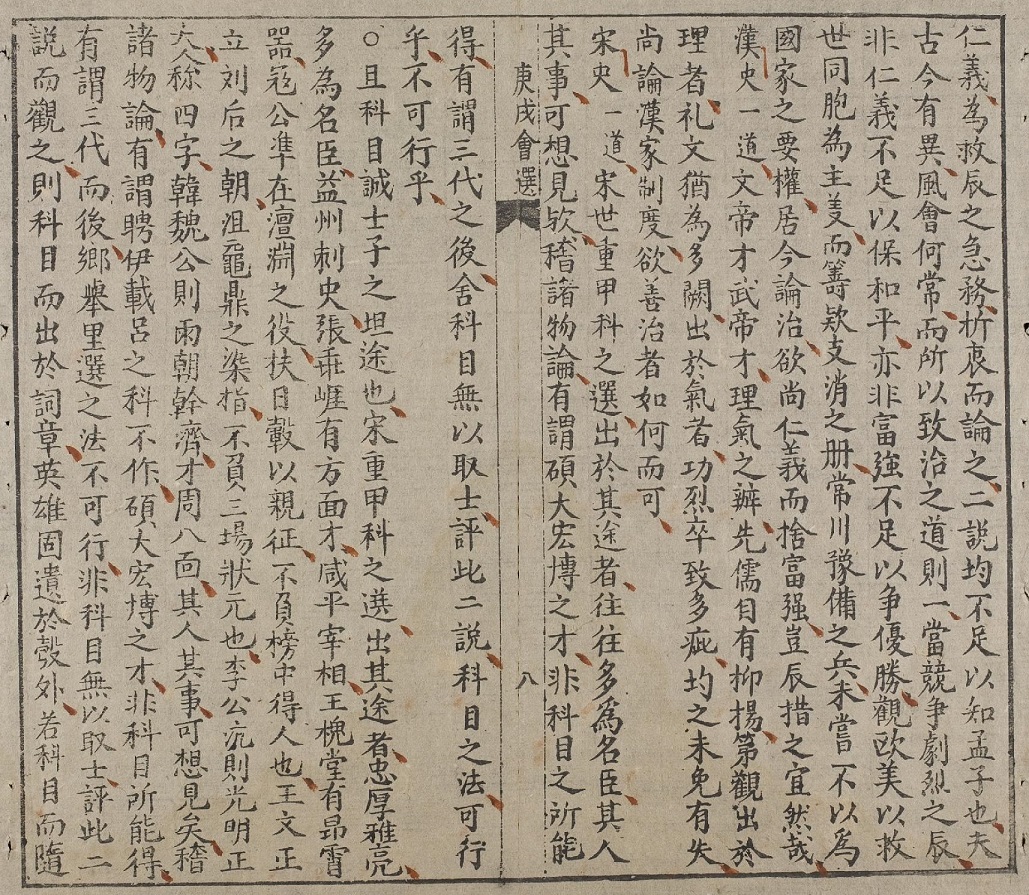In the nineteenth century there were Chinese scholars who realized that China needed to catch up with the technological advances of Western nations. This was referred to as the need for “wealth and power” (fuqiang 富强).
What Chinese scholars did not want, on the other hand, were Western ideas, as they felt that those were inferior to Chinese ideas.

In the previous two posts I translated questions and “model answers” from the civil service exam that was held in 1910 in Vietnam. Most of the questions on the exam that year required that exam candidates address issues in the [Confucian] classics.
One of the questions dealt with the Mencius (Mengzi 孟子), and it also discussed this issue of the need for “wealth and power.”

Here is the question:
戰國之世,時侯專事富强,孟賢卻言仁義,當辰指為迂闊空言,先儒謂其救時急務。折衷而論,二說何如。夫古今有異,風會何常,論治者欲尚仁義捨富强,時指之宜乎否也。
In the world of the Warring States, at that time the feudal lords focused on wealth and power, but sage Mencius talked about benevolence and righteousness. At that time this was labelled as unrealistic and empty talk, but early [Confucian] scholars said that this was his urgent mission to change the tide of the times. Speaking fairly, how do we assess those two positions? The past and the present are different, and conditions [can be] unprecedented. As for administrators who wish to uphold benevolence and righteousness and to discard wealth and power, will this be labelled now as appropriate or not?

And here is the answer:
戰國之時,爭城用地,時侯尚富强,制產明論。孟子卻言仁義,然言仁義而不外農桑教養等實事,未嘗偏捨富强也。時侯不察而指為迂闊空言,後儒謂時侯急於富强,而孟子專說仁義,為救時之急務。折衷而論之,二說不足以知孟子也。
During the Warring States period, citadels were contended for and land was taken, as the feudal lords at that time wished to gain wealth and power. Mencius, on the other hand, talked about benevolence and righteousness, but benevolence and righteousness [to him] was nothing other than the practical matters of agriculture and education, and he was never inclined to discard wealth and power.
The feudal lords at that time did not investigate this and labelled this unrealistic and empty talk. Later [Confucian] scholars said that the feudal lords at this time were urgently trying to gain wealth and power, but Mencius focused on talking about benevolence and righteousness in his urgent mission to change the tide of the times. To speak fairly about this, neither of these two positions are sufficient to understand Mencius.
夫古今有異,風會何常,而所以致治之道則一。當競爭劇烈之時,非仁義不足以保和平,亦非富强不足以爭優勝。觀歐美以救世同胞為主義,而籌款支消之冊,常川豫備之兵,未嘗不以爲國家之要權。居今論治,欲尚仁義而捨富强,豈時指之宜然哉。
The past and the present are different, conditions [can be] unprecedented, but the way of bringing about [proper] administration is the same. When there is intense competition, without benevolence and righteousness one cannot guarantee peace, and without wealth and power one cannot compete for dominance.
In observing Europe and America, [we see that they] take saving their compatriots as an ideology [dĩ cứu thế đồng bào vi chủ nghĩa 以救世同胞為主義], and that their account books and ever-ready soldiers are always there for the essential rights of the nation. To look at administration from the current vantage point, to wish to uphold benevolence and righteousness and to discard enrichment and strengthening, how can this be labelled now as appropriate?

This is a fascinating question and answer. The question looks for an “either/or” answer, but the answer provided is “in between,” but weighted towards one side.
Neither benevolent and righteousness nor wealth and power is enough in the modern age. . . but you definitely need wealth and power. . .
